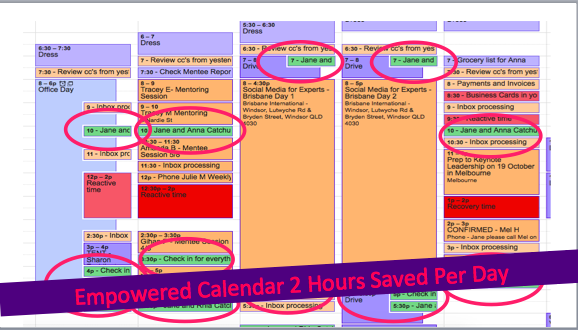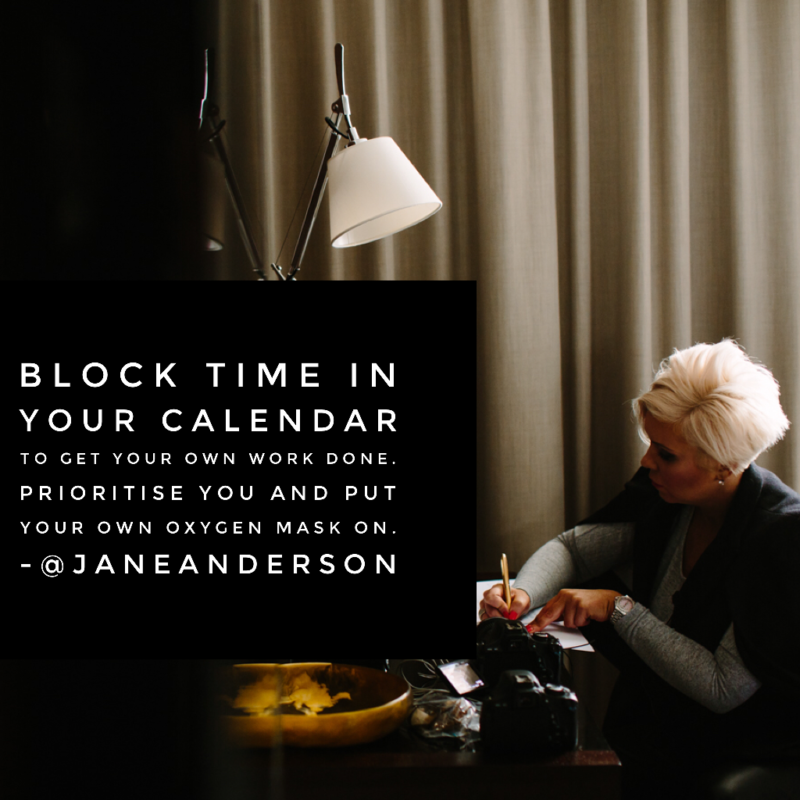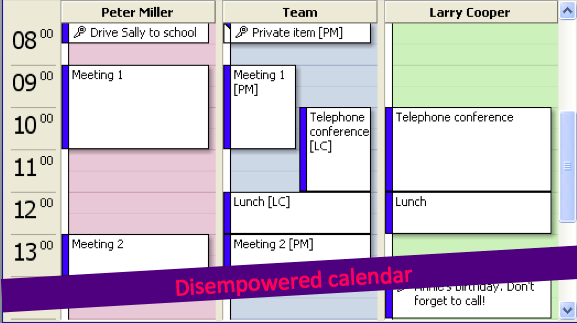5 Practical Ways to Shift your Day from Disempowered to Powerful
Did you know that the average person spends an extra 10 hours per week at work? That’s 50 hours per week. Meanwhile, the average entrepreneur works about 80 hours per week!
I often work with people who are burnt out, exhausted, tired and disempowered in their work. Their energy has been depleted. They’ve tried to do too much, they’ve tried to do more with less, and they’ve tried to manage the overwhelm of complex decisions and tasks on a day-to-day basis.
It was productivity consultant David Allen who said, “You can do anything, but not everything.”
I typically find that most people have a calendar that’s full of meetings and nothing else. There’s no time allocated for their own work or for administrative tasks such as processing emails, making phone calls and all the little things that must get done. This is a recipe for personal and professional disaster.
After coaching thousands of people, I know that the key to stepping into your power is having an empowered calendar. An empowered calendar ensures you spend your time making progress. It helps you focus on traction instead of friction. It creates a high return on the investment of your time and advances your career and business much more rapidly.

There are five key things you can do to create an empowered calendar for 2018:
1. Allocate time for your work.
Most calendars I look at have everybody else’s needs in them, usually in the form of meetings. If your day is full of meetings, you probably won’t get started your work until 5 o’clock when everybody else has gone home. This is a sure-fire way to exhaustion. You need to make yourself and your work the number one priority in your calendar. Only after you prioritise your work first should you allocate meetings and other people’s needs.
It’s also important you allocate time for your big projects and goals. It was Stephen Covey, author of The 7 Habits of Highly Effective People, who said you’ve got to have the big rocks in your calendar first. If you don’t schedule the big items in your calendar and instead only include all the little things, you’ll be unable to fit the bigger, more important things in later. All that space will be consumed by the smaller rocks.
This is particularly important for projects. Break your projects down into smaller, manageable tasks. Estimate how long each task will take and put those times into your calendar. Most people tend to put these smaller tasks on a to-do list. The problem with this is if the task is going to take more than 10 minutes, they usually don’t get done and the project stalls. It’s important you calendarise them.
So, my advice is to look at your to-do list. Is there anything on your list that will take more than 10 minutes? If so, decide what the next logical step for this task is, how long it will it take and when you need to do it, then move it over to your calendar.

2. Batch communications with regular people.
One of the most common things I see when helping people to become more empowered is that they lose huge amounts of time to frequent interruptions. While we have tried to create more collaborative work environments with open-plan workplaces, we have actually decreased respect for people’s time and headspace.
Research tells us that you are seven times more likely to not go back to what you were doing if you are interrupted. We tend to put the focus of blame onto other people for interrupting us, but the problem is these people aren’t mind readers. They don’t know what you’re working on or that you’re concentrating. They typically just want to tell you about an idea, the latest development or something about their weekend. Sometimes, they want to vent and get something off their chest.
If you allow these interruptions to continue, you start to turn into a garbage dump. That is, everybody dumps their stuff on you. When they’ve finished, you’re left trying to get back to what you were doing. It’s up to you to gain control and create boundaries around your time. An efficient way of dealing with interruptions is to batch communications with people who regularly interrupt you. Rather than letting them interrupt you five times a day, create a list of these people and connect with them during mutually agreed times.
Now, I’m not saying you can’t interrupt each other if it’s an urgent, business-critical, must-deal-with-it-now situation. But if it can wait, leave it for that pre-allocated time in your calendar. This way, the person is reassured that they’ll be able to speak with you. It also puts the onus of responsibility on them to write the matter down for later instead of interrupting and dumping it on you. Just this one skill can save you almost 1.5-2 hours per day managing this alone.

3. Recovery time.
Stephen Covey found that even high-performing organisations and individuals spend 25% of their time on urgent, important yet unexpected tasks. The problem is that most people don’t expect the unexpected and they get frustrated when unexpected tasks do arise.
Although we spend about a quarter of our time on things we didn’t anticipate, our calendars generally don’t reflect this. What you need to do is allocate time in your calendar for “recovery.” By recovery, I mean catching up on tasks and dealing with the unexpected. If you have been traveling, in a workshop or on leave, you will need some recovery time to process emails and deal with urgent inquiries once you’re back online. If you can allocate about 25% of your day to recovery or important tasks you didn’t expect, it will relieve a lot of stress and help you feel more empowered in your day.
4. Batch process anything that will take 10 minutes or less.
If you look at your to-do list, all the tasks listed will have varying completion times. Too often, we spend inordinate amounts of time working on these little tasks. It’s impossible to feel empowered at work when we lose so much time this way.
To become more efficient, you need to allocate time in your calendar for processing tasks that will take 10 minutes or less. These tasks could include calling the bank, filing or sending an email to someone. By batching these smaller tasks, you reduce the amount of friction in your day. You aren’t constantly switching between different headspaces and creating decision-fatigue. You’ll also stay far more focused when working on your bigger projects and tasks.

5. Break projects down into smaller manageable tasks
Humans aren’t wired for longer, larger projects. We’re built for the small here and now. We get a rush of endorphins when we get to tick things off the list so there is a high payoff to get the little things done. However, in a world where organisations are needing more project-based workers, we need to adapt to think bigger. The challenge is that the average person hasn’t been shown how to do this. Sure, you might have this all in your project plan or spreadsheet, but the key to implementation is to break the project into manageable tasks and then allocate time in the calendar for each activity. Without this step delays ensue, the project loses priority, time frames and budgets blow out. We underestimate what can be done in a lifetime but over estimate what can be done in a day. The secret is progress not perfection and small incremental steps.
If you can do these five things, you’ll have a calendar that works for you. You’ll feel more empowered knowing that your time isn’t being lost. You’ll feel more fulfilled in your work and have a greater a sense of achievement. You will be in control and in charge of your day.
With an empowered calendar, you will make progress and achieve your potential.
Love to know your thoughts!

Jane Anderson is a communications expert, speaker and the author of 4 books including “EXPERT to INFLUENCER: 12 Key Skills to Attract New Clients, Increase Sales and Leverage your Personal Brand to Become an Industry Leader.” With over 20 years experience helping people step into their personal power, she is obsessed about creating human connection to drive business growth in a world of disruption and automation. To inquire about her working with you or your organisation please contact us here.
Facebook Comments
Originally published at janeandersonspeaks.com


